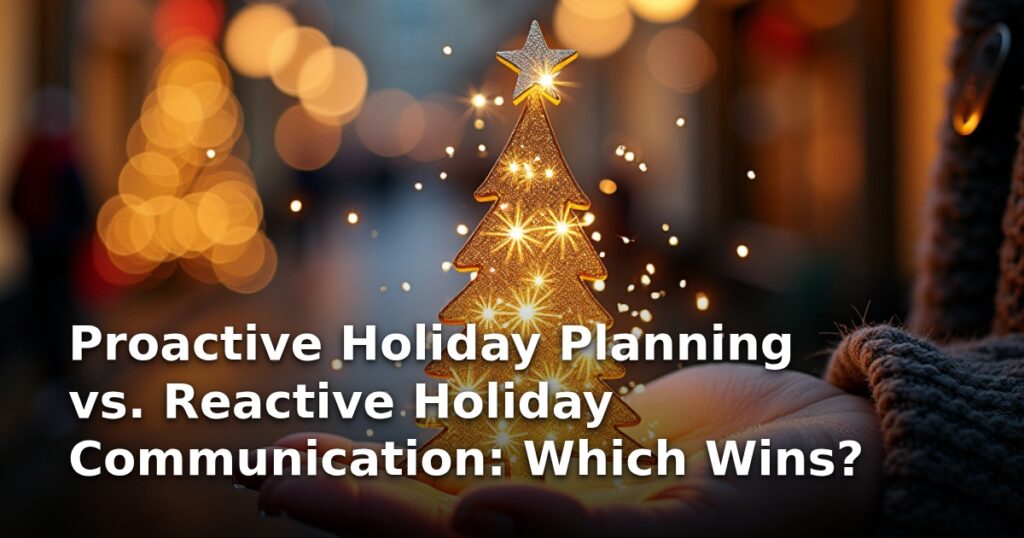Proactive Holiday Planning vs. Reactive Holiday Communication: Which Wins?
The holiday season, often touted as a time for joy and connection, frequently becomes a crucible for relationship stress. Successfully navigating this high-pressure period hinges significantly on whether you adopt a strategy of proactive holiday planning vs. reactive holiday communication. This comparison is essential reading for couples, families, and individuals seeking holiday relationship advice to maintain harmony amidst demanding schedules, financial pressures, and complex family dynamics. We will dissect these two fundamental approaches—one built on foresight and preparation, the other on improvisation and damage control—to help you determine which strategy best preserves your well-being and strengthens your most important connections.
Overview of Proactive Holiday Planning
Proactive holiday planning involves anticipating potential stressors before they materialize and establishing clear frameworks for decision-making. This approach treats the holidays not as a spontaneous event, but as a project requiring strategic foresight.
For couples, this might mean scheduling dedicated "check-in" meetings in October to discuss budgets, travel itineraries, and gift expectations. It is heavily focused on boundary setting and mutual agreement on expectations regarding time allocation, especially when managing in-law relationship stress is a recurring theme. The goal is to minimize surprises and ensure both partners feel heard and respected before the emotional intensity ramps up.
Overview of Reactive Holiday Communication
Reactive holiday communication, conversely, involves addressing issues as they arise. This approach often stems from a desire to maintain flexibility or an underestimation of the logistical complexity involved. When conflicts flare up—perhaps an unannounced guest shows up, or one partner feels overburdened by hosting duties—reactive communication kicks in, often characterized by immediate emotional responses.
While spontaneity has its charms, in the context of high-stakes family events, reactivity can quickly devolve into conflict escalation. It is the default setting for many when staying connected during stressful work periods has already depleted their emotional reserves, leaving little bandwidth for pre-emptive negotiation. This style often requires immediate conflict resolution rather than sustained peace-building.
Feature-by-Feature Comparison
To effectively compare these two strategies, we must examine them across several critical relationship maintenance criteria.
Features/Capabilities

| Feature | Proactive Planning | Reactive Communication |
|---|---|---|
| Conflict Resolution | Preventative; agreements are established beforehand. | Corrective; requires immediate negotiation under pressure. |
| Expectation Setting | Explicitly defined regarding gifts, travel, and chores. | Assumed or addressed only when unmet. |
| Boundary Management | Clearly articulated boundaries (e.g., dedicated quiet time). | Boundaries tested and enforced moment-to-moment. |
| Stress Mitigation | High; stress is distributed across planning phases. | Low; stress concentrates during the event itself. |
Pricing/Value
The "price" here is not monetary but emotional and temporal. Proactive planning demands a higher initial investment of time and energy during quieter months. However, the value derived is long-term relationship stability and reduced acute stress during December. Reactive communication appears cheaper upfront (less planning time), but the hidden cost is significant: increased risk of arguments, emotional exhaustion, and potential damage to effective communication in marriage.
Ease of Use
Reactive communication is inherently easier in the short term because it requires no scheduled preparation. It relies on the status quo. Proactive planning requires discipline, scheduling, and sometimes difficult conversations (e.g., discussing finances or setting limits with family members). It is a higher-effort, high-reward system.
Performance
When performance is measured by relationship satisfaction and reduced conflict, proactive planning demonstrably outperforms reactivity. A well-planned holiday minimizes the signs your partner is pulling away because both individuals feel their needs are being addressed systematically. Reactive communication often leaves one or both partners feeling unheard, leading to withdrawal or outbursts.
Support and Community
Proactive planning fosters a supportive structure. By agreeing on a plan, partners form a unified front, which is crucial when navigating external pressures like extended family demands. Reactive communication often leaves partners isolated within the conflict, as they are negotiating the terms of engagement in real-time rather than operating from a shared agreement.
The Role in Key Relationship Challenges
The choice between proactive and reactive strategies becomes most apparent when addressing specific seasonal hurdles.

Managing In-Law Relationship Stress
For couples struggling with managing in-law relationship stress, proactive planning is non-negotiable. This involves jointly deciding how much time to spend with each family, establishing exit strategies for uncomfortable conversations, and agreeing on a united front regarding traditions or hosting responsibilities. Reactivity here means one partner might cave to parental pressure, leading to resentment toward the other partner later.
Staying Connected During Stressful Work Periods
When work demands peak concurrently with holiday preparations, couples often default to reactivity. However, this is precisely when staying connected during stressful work periods requires planning. Proactivity involves scheduling 15-minute "decompression calls" or agreeing to outsource certain tasks (e.g., hiring catering) to save relational energy. Without this structure, both partners may feel unsupported and assume the other is not prioritizing the relationship.
Dating Advice for the New Year
Even if the holiday period is managed poorly, the lessons learned inform future success. If reactivity caused significant strain, the necessary dating advice for the new year must center on implementing proactive check-ins. This means transitioning from crisis management to scheduled maintenance, ensuring that minor issues are discussed before they become holiday-threatening blowups.
Pros and Cons Analysis
Proactive Holiday Planning
Pros:
- Reduces acute stress during the actual events.
- Builds trust through demonstrated follow-through on agreements.
- Creates a foundation for effective communication in marriage year-round.
- Allows for thoughtful boundary setting, essential for holiday relationship advice.
Cons:
- Requires significant upfront time commitment.
- Can feel restrictive if one partner resists structured discussion.
- May stifle genuine spontaneity if over-managed.

Reactive Holiday Communication
Pros:
- Requires minimal initial effort.
- Allows for maximum short-term flexibility.
Cons:
- High risk of misunderstandings and escalated conflict.
- Often leads to feelings of resentment and being unheard.
- Increases the likelihood of observing signs your partner is pulling away post-event.
Use Case Recommendations
Which approach is best depends on the couple's established communication baseline and the complexity of their upcoming season.
Choose Proactive Planning If:
- You anticipate high external demands (extensive travel, hosting multiple events).
- In-law dynamics are historically challenging, making managing in-law relationship stress a priority.
- You are committed to improving effective communication in marriage as a core goal for the season.
Choose Reactive Communication (With Caution) If:
- Your schedule is unusually light, and you genuinely prefer minimal structure.
- You already possess an exceptionally high baseline of trust and open, non-defensive communication skills.
- You are using the season as a low-stakes trial period before implementing better dating advice for the new year.
Final Verdict: The Decisive Win for Foresight
While reactive communication offers the illusion of ease, the evidence overwhelmingly points to proactive holiday planning as the superior strategy for relationship preservation and enhancement. The holidays amplify existing patterns; if communication is weak, reactivity will break it further. If communication is strong, proactivity will fortify it.
By investing time upfront to discuss expectations, boundaries, and potential pain points—whether related to gifts, hosting duties, or family expectations—couples transform the holiday season from a series of potential traps into a structured celebration. This foresight is the bedrock of strong holiday relationship advice, ensuring that instead of fighting fires, you are truly enjoying the moments that matter. Make the choice today to plan your peace, not just react to your problems.



